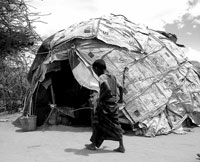by Nicolas Seris, Humanitarian Aid programme coordinator, Transparency International Kenya.
Yesterday Roslyn wrote about climate change and natural disasters. This is particularly relevant in Kenya, where Transparency International Kenya and World Vision International hosted the regional launch of the TI Pocket Guide of Good Practices for Preventing Corruption in Humanitarian Operations on April 14, 2011 in Nairobi.
Climate is changing in Kenya and neighbouring countries in the Horn of Africa. Once upon a time, farmers knew from their fathers and elders in the village when to plant, when to harvest, as the rains were more or less predictable. In the last years, Kenya has experienced annual droughts. As the droughts worsen, pressure on grazing pastures and water sources is increasing, fuelling tensions between communities and forcing displacement of population.
In Western Kenya, the breadbasket of the country, the deforestation of 400 hectares of the Mau Forest Complex and the eviction of more than 100,000 people from their piece of land between 2006 and 2008 is a stunning example of the dramatic impact of climate change. Read more about forestry in part 6 of the GCR.
Climate change and related natural disasters are driving more and more people to be dependent on humanitarian organisations to ensure their basic needs such as food, water, shelter, etc. Diversion of these basic resources from vulnerable people is the most damaging impact of corruption in the humanitarian sector.
Part five of the GCR looks at these issues in greater detail. In addition, TI-Kenya is undertaking two new projects aiming at enhancing integrity and accountability in humanitarian operations and climate change mitigation initiatives:
- The Food Assistance Integrity project will identify integrity loopholes in the implementation of different types of food assistance programmes. TI Kenya will engage with key actors in the sector to agree upon measures to enhance transparency, integrity and accountability mechanisms and provide more effective food security.
- The Climate Finance Governance project will promote transparency, accountability, integrity and anti-corruption safeguards in climate change mitigation activities in Kenya and increase the capacity of stakeholders to better engage, cooperate and contribute to policy development, implementation and oversight of low-carbon technology

















 Connect with us on Facebook
Connect with us on Facebook Follow us on Twitter
Follow us on Twitter